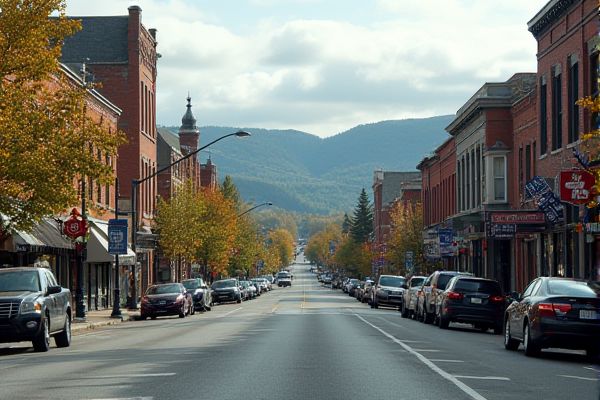
What to know as new resident in Vermont: Weather varies drastically by season. Vermont offers diverse outdoor activities. Local food scene is thriving. Embrace the small-town community spirit. Winters require snow preparedness. Public transportation options are limited. Strong emphasis on sustainability and eco-friendliness. High commitment to local arts and culture. Vermont's education system is highly rated. Familiarize with Vermont tax regulations.
Weather varies drastically by season.
In Vermont, the weather varies drastically by season, with warm and sunny summers averaging around 80°F (27°C), a colorful and cool fall, a long and cold winter with significant snowfall, and a spring marked by melting snow and rapidly changing temperatures. Each season offers unique outdoor activities and scenic experiences, but also brings distinct weather patterns and potential extreme weather events. For more in-depth insights, explore the weather page on the Hickok & Boardman website.
Vermont offers diverse outdoor activities.
Vermont offers a diverse range of outdoor activities year-round, including hiking, kayaking, cycling, skiing, snowshoeing, ice skating, rock climbing, fat biking, disc golf, and more, with accessible paths and adaptive equipment options for all abilities. The state's remarkable landscape provides countless opportunities to enjoy nature in every season, making it an ideal destination for adventure enthusiasts. For more information on exploring these activities, you can visit the official website of Vermont Vacation, which provides detailed guides and tips to enhance your outdoor experiences in this beautiful region.
Local food scene is thriving.
Vermont's local food scene is thriving, with a strong emphasis on farm-to-table cuisine, seasonal produce, artisanal cheeses, craft beers, and local wines. The state offers various culinary experiences, including farm tours, farmers markets, and restaurants that highlight the contributions of local growers, producers, and chefs. To delve deeper into these unique gastronomic adventures, consider exploring the offerings at Vermont Vacation, where the richness of Vermont's culinary traditions comes to life.
Embrace the small-town community spirit.
To embrace the small-town community spirit in Vermont, one can participate in local gatherings like Community Lunch, engage with neighbors at central gathering places, and join online forums. Additionally, volunteering for community activities helps build strong connections and a sense of belonging among residents.
Winters require snow preparedness.
To prepare for winters in Vermont, ensure your home is insulated and heated safely, stock up on essential supplies like food, water, and warm clothing, and have emergency kits for both staying at home and traveling. Additionally, learn how to spot and treat frostbite and hypothermia, and take necessary precautions when driving in winter conditions, such as keeping your vehicle winterized and carrying a Winter Storm Survival Kit. By taking these steps, you can keep yourself and your family safe during harsh winter months.
Public transportation options are limited.
Public transportation in Vermont, while available, has limited options, particularly in rural areas, with needs for improved service levels, evening and weekend service, and better first mile/last mile connections to make the system more accessible. To enhance the quality and reach of public transit, it is vital to address these gaps in service, ensuring that all residents can benefit from reliable and convenient transportation options. As detailed in the Section 20 Report, strategic improvements could significantly impact rural transit systems, offering communities enhanced mobility and better access to essential services.
Strong emphasis on sustainability and eco-friendliness.
As a new resident in Vermont, you'll find a strong emphasis on sustainability and eco-friendliness, with initiatives such as eco-conscious outdoor recreation, regenerative agritourism, and eco-friendly hotels and resorts that prioritize green practices like recycling, composting, and the use of solar panels and electric car chargers. The state also supports sustainable living through bioenergy initiatives, smart growth principles, and businesses dedicated to energy efficiency and environmental stewardship. For more information, visit Matador Network to explore how Vermont is leading the way in sustainable travel and living.
High commitment to local arts and culture.
Vermont has a high commitment to local arts and culture, with the arts community employing over 4,000 people across 3,279 businesses, contributing nearly $20M in direct state and local revenues. This flourishing sector is supported by organizations like the Vermont Arts Council and local initiatives to promote and expand artistic enterprises. For more information, visit the Vermont Arts and Culture Program to explore how the state nurtures its vibrant artistic community.
Vermont's education system is highly rated.
Vermont's education system is highly rated, with the state achieving remarkable progress in high school graduation rates and Advanced Placement testing scores. Known for its unique funding model, the system ensures equity by pooling costs statewide, allowing for small class sizes and maintaining a strong commitment to educational excellence. This approach underscores equal opportunities for all students. For more detailed information, you can explore the comprehensive overview available on Education in Vermont.
Familiarize with Vermont tax regulations.
As a new resident in Vermont, it is crucial to understand that you are considered a resident if you are domiciled in Vermont or maintain a permanent home there and are present for more than 183 days in the taxable year. You must file a Vermont income tax return if your income, after certain exemptions, exceeds $100, and you will be subject to Vermont's progressive income tax rates ranging from 3.55% to 9.4% based on your adjusted gross income. More detailed information can be found on the Vermont Department of Taxes website, which provides invaluable resources for understanding your tax obligations as a Vermont resident.
